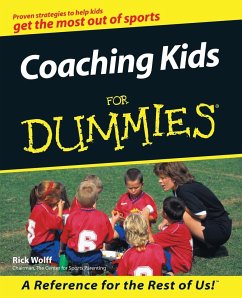Rick Wolff
Coaching Kids for Dummies
23,99 €
inkl. MwSt.
Versandfertig in über 4 Wochen

12 °P sammeln
Rick Wolff
Coaching Kids for Dummies
- Broschiertes Buch
- Merkliste
- Auf die Merkliste
- Bewerten Bewerten
- Teilen
- Produkt teilen
- Produkterinnerung
- Produkterinnerung
Packed with practical advice for coaches and parents The easy way to motivate kids and boost performance How do you get kids started in sports? Or provide encouragement without pushing too hard? Or instill a sense of sportsmanship? In this friendly guide, noted sports-parenting authority Rick Wolff provides the answers -- and shows you step-by-step how to make sports a positive experience for kids of all ages. THE DUMMIES WAYTM * Explanations in plain English * "Get in, get out" information * Icons and other navigational aids * Online cheat sheet * Top ten lists * A dash of humor and fun…mehr
Andere Kunden interessierten sich auch für
![Learning in Sports Coaching Learning in Sports Coaching]() Learning in Sports Coaching181,99 €
Learning in Sports Coaching181,99 €![Adventure Sports Coaching Adventure Sports Coaching]() Adventure Sports Coaching180,99 €
Adventure Sports Coaching180,99 €![Teaching and Coaching Lifestyle Sports Teaching and Coaching Lifestyle Sports]() Teaching and Coaching Lifestyle Sports190,99 €
Teaching and Coaching Lifestyle Sports190,99 €![A Constraints-Led Approach to Swim Coaching A Constraints-Led Approach to Swim Coaching]() Andrew SheaffA Constraints-Led Approach to Swim Coaching182,99 €
Andrew SheaffA Constraints-Led Approach to Swim Coaching182,99 €![Professional Practice in Sport Performance Analysis Professional Practice in Sport Performance Analysis]() Andrew ButterworthProfessional Practice in Sport Performance Analysis161,99 €
Andrew ButterworthProfessional Practice in Sport Performance Analysis161,99 €![Talent Identification and Development in Sport Talent Identification and Development in Sport]() Talent Identification and Development in Sport170,99 €
Talent Identification and Development in Sport170,99 €![Sport Coach Learning and Professional Development Sport Coach Learning and Professional Development]() Bob MuirSport Coach Learning and Professional Development176,99 €
Bob MuirSport Coach Learning and Professional Development176,99 €-
-
-
Packed with practical advice for coaches and parents The easy way to motivate kids and boost performance How do you get kids started in sports? Or provide encouragement without pushing too hard? Or instill a sense of sportsmanship? In this friendly guide, noted sports-parenting authority Rick Wolff provides the answers -- and shows you step-by-step how to make sports a positive experience for kids of all ages. THE DUMMIES WAYTM * Explanations in plain English * "Get in, get out" information * Icons and other navigational aids * Online cheat sheet * Top ten lists * A dash of humor and fun Discover how to: * Help kids select the best sports for them * Communicate effectively * Deal with losses (and wins) * Foster good sportsmanship * Prevent sports burnout * Evaluate travel teams
Hinweis: Dieser Artikel kann nur an eine deutsche Lieferadresse ausgeliefert werden.
Hinweis: Dieser Artikel kann nur an eine deutsche Lieferadresse ausgeliefert werden.
Produktdetails
- Produktdetails
- Verlag: Wiley
- Seitenzahl: 272
- Erscheinungstermin: 7. April 2000
- Englisch
- Abmessung: 235mm x 191mm x 14mm
- Gewicht: 503g
- ISBN-13: 9780764551970
- ISBN-10: 0764551973
- Artikelnr.: 21323365
- Herstellerkennzeichnung
- Libri GmbH
- Europaallee 1
- 36244 Bad Hersfeld
- gpsr@libri.de
- Verlag: Wiley
- Seitenzahl: 272
- Erscheinungstermin: 7. April 2000
- Englisch
- Abmessung: 235mm x 191mm x 14mm
- Gewicht: 503g
- ISBN-13: 9780764551970
- ISBN-10: 0764551973
- Artikelnr.: 21323365
- Herstellerkennzeichnung
- Libri GmbH
- Europaallee 1
- 36244 Bad Hersfeld
- gpsr@libri.de
Rick Wolff, a nationally recognized sports-parenting expert, coach, and author, who is also a former professional baseball player, currently hosts a popular sports-parenting program on WFAN radio.
Introduction 1
About This Book 1
Foolish Assumptions 2
How This Book Is Organized 3
Part I: A Parent's Primer 3
Part II: Coaching Tasks 3
Part III: Motivation and the Mental Game 3
Part IV: Coaching Challenges 3
Part V: The Part of Tens 4
Appendixes 4
Icons Used in This Book 4
Where to Go from Here 5
Part I: A Parent's Primer 7
Chapter 1: An Introduction to Sports Parenting 9
Getting Started 10
Soccer Moms Register Here! 12
Back When I Was a Kid 14
Fondly remembering the old days 15
Keeping in mind how you started out 15
Considering your child's abilities 16
Achieving parental balance 17
What Kids Want 18
From their coaches 18
From their parents 20
Chapter 2: Determining the Right Age to Begin Sports 23
The Early Years: Ages 1 to 3 25
The Learning Phase: Ages 4 to 8 26
The two keys: patience and praise 26
Teaching the ultimate lesson in sports 28
Teaching kids how to have fun 28
Coping with parental expectations 29
"But I don't want to play!" 30
"I don't want to get hurt" 31
Boys and girls playing together? 32
Flashes of Athletic Brilliance: Ages 9 to 12 33
The beginnings of fair play 34
Who teaches sportsmanship? 35
Enforcing a sense of sportsmanship 36
Acquiring a sense of commitment 36
Developing discipline 38
Young, Independent Athletes: Ages 13 and Older 38
"Playing Up" a Gifted Athlete 41
Chapter 3: Dealing with Your Child's (And Your Own) Disappointments 43
When Personal Goals Aren't Met 44
Avoiding the PGA (post-game analysis) 45
Offering a praise sandwich 46
Working off the disappointment 47
When Your Child Behaves Badly 48
When the Future Doesn't Appear to Hold Promise 50
When the Athlete Wants to Quit 52
Chapter 4: Evaluating the Pros and Cons of Travel Teams 55
Are Travel Teams Really Necessary? 56
Dealing with Disappointment at Tryouts 57
Knowing What to Ask a Travel Team Coach 59
Keeping It Fun - Even at a Competitive Level 59
Looking at Travel Teams and Burnout 60
The Myth of "Staying Ahead of the Curve" 62
Chapter 5: Understanding the Differences between Individual and Team Sports
63
Helping Your Child After an Individual Loss 63
Dealing with an "Alibi Ike" 64
Reinforcing that they can only do their best 65
"But I'll never beat that other player!" 65
Encouraging Sportsmanship in Individual Play 66
Finding the Right Coach for Your Individual Athlete 67
Coaching Your Own Child in Individual Sports 68
Part II: Coaching Tasks 71
Chapter 6: Outlining Your Responsibilities As a Youth Coach 73
Thinking about Volunteering as a Coach 74
Getting the green light from your child 74
Determining whether you have the proper temperament 75
Finding the time 76
Head Coach or Assistant Coach? 76
Focusing on Your Top Priority As a Coach 77
Other coaching priorities to consider 78
Having fun 79
Remembering That Young Athletes Are Not Professional Athletes 80
What the Kids Want from You 81
What the Parents Want from You 84
Chapter 7: Setting Up for the Season 85
"But I've Never Coached Before!" 85
Learning the Rules of the Game - and of the League! 86
Scheduling the All-Important First Team Meeting 88
Working with Your Assistant Coach(es) 92
Chapter 8: Preparing and Conducting Practices 95
Preparing in Advance 95
Getting Kids to Manage Their Time 97
Coaching by Walking Around 98
Developing a Sense of Spontaneity 98
Addressing Disciplinary Problems during Practice 99
Setting the tone 100
Drafting a code of conduct 100
What is an appropriate punishment? 100
Using your coaching "common sense" 102
Dealing with a Child Who's a Chronic Discipline Problem 102
Recognizing and Handling Typical Excuses 104
Chapter 9: Coaching during a Game or Meet 107
Getting Ready for a Game or Meet 107
Making some key phone calls 107
Handling inclement weather 109
Preparing your scoresheet 109
Determining your starting lineup 110
Making Last-Minute Pregame Preparations 111
Coaching during a Game 112
Give praise, praise, and more praise to the kids 112
Act in a sportsmanlike manner 113
The Post-Game Wrap-Up 117
Part III: Motivation and the Mental Game 119
Chapter 10: Motivating Today's Young Athletes 121
"Motivating" by Yelling - Why It Doesn't Work 122
How the best coaches motivate 123
So why don't more coaches use the quiet approach? 123
How to Talk to Young Athletes Today 124
Speaking at their level - not down to them 124
Treating kids with respect 125
Remembering that there's no "I" in team 126
Using good performances to discuss criticisms 126
Helping young athletes when they're disappointed 128
Encouraging a team that's always losing 130
Motivating an individual young athlete 131
Chapter 11: Teaching the Basics of Good Sportsmanship 135
Understanding the Potential Impact of the Youth Coach 136
Determining What Constitutes Good Sportsmanship 137
Good sportsmanship begins with you 138
. . . and teach the parents well, too 139
Enforcing Good Sportsmanship with the Kids 139
Part IV: Coaching Challenges 141
Chapter 12: Handling Tough Situations with Your Team 143
Understanding the Classic Types of Parents 143
The flatterer 144
The know-it-all 144
The dingbat 145
The loud-mouth 146
The comparer 147
Recognizing the Classic Types of Challenging Kids 148
The whiner 148
The egocentric superstar 149
The non-talker 150
The short-attention-span athlete 151
Dealing with A Moody Team 152
Chapter 13: Coping with Kids' Sports Injuries 155
The Basics: What You Need to Know 155
Gauging your reaction 156
Checking the first-aid kit 156
Keeping a cell phone on hand 157
Responding when kids want to return to action too quickly 157
Having a Medical Professional on the Sidelines 159
Making Equipment a Priority 159
Addressing Special Needs of Certain Kids 160
Chapter 14: Coaching Your Own Child 161
Finding Out What Your Child Wants 161
Communicating with Your Child 162
Being Prepared for a Presumption of Favoritism 163
Watching Your Words Carefully - with All Kids! 165
Understanding the Politics of All-Star Teams 167
Chapter 15: Dealing with the Stresses of the Job 169
Congratulations, Coach - You're the Topic of
Saturday Night Conversations! 169
Working effectively with unhappy parents 170
Avoiding the cold, honest truth 171
Calling an emergency team meeting 173
Listening to Your "Coaching Partner" - Your Spouse 175
Giving Yourself a Job Evaluation 176
Presenting Final Words of Praise 177
Part V: The Part of Tens 179
Chapter 16: Ten Things Every Parent Should Know 181
Give Your Child Some Space 181
Give Your Child's Coach Some Space, Too 182
Be There To Watch Your Child Compete 182
Praise Your Child 183
Expose Your Kids To a Variety of Sports 183
Let Them Develop Their Own Passion 184
Go Easy Down Memory Lane 184
Be Careful About Applying Pressure 185
Remember That It's Their Childhood, Not Yours 185
Let Them Dream 186
Chapter 17: Ten Great Coaching Tips 187
Be Sensitive to Every Child's Needs 187
Get the Kids to Believe in Themselves 188
Don't Let Noisy Parents Get out of Control 188
Cooperate with Officials 189
Be Careful When Trying Reverse Psychology on a Child 190
Forget the Knute Rockne Pep Talks 190
Keep in Mind That Motivation Still Comes from within the Child 191
Be More Than Fair - Be a Good Coach 191
Remember That the Younger the Kids,
the Less Important the Score 192
When in Doubt, Stand Back and Enjoy! 192
Chapter 18: Ten (Actually, 20) Brief Tips for Becoming a Great Coach 195
Give Your Team Positive Experiences 195
Organize a Pre-Season Team Meeting 195
Know Your Team's Special Medical Needs 196
Educate Yourself about the Sport 196
Determine Your Coaching Style 196
Set Realistic Expectations for the Kids 196
Be Sure Your Team Has the Proper Equipment 196
Organize Your Practice Sessions to Be Quick-Paced 197
Put Your Assistant Coaches to Work during Practices and Games 197
Remember That Parents Come to Games to
Watch Their Own Kids Play 197
Keep a Detailed Scoresheet 197
Use the Best Motivational Technique: Praise! 197
Communicate, Communicate, Communicate 198
Teach Sportsmanship 198
Motivate by Walking Around 198
Use Common Sense When Faced with Injuries 198
Avoid a Post-Game Analysis at All Costs! 198
Give Upset Parents a Chance to Speak Their Peace 199
Remember That Travel Teams Can Also Mean Rejection 199
Keep in Mind That Kids in Individual Sports
Have Unique Pressures 199
Appendix A: Youth Sports Organizations 201
Multi-Sport Organizations 201
Baseball and Softball Organizations 202
Basketball Organizations 205
Football Organizations 205
Golf Organizations 206
Hockey Organizations 206
Soccer Organizations 207
Swimming Organizations 208
Tennis Organizations 208
Track and Field Organizations 208
Coaching Resources on the Web 209
Appendix B: The Coach's Resource Kit 211
To Coach or Not to Coach 211
Developmental Phases of Young Athletes 213
Ages 1 to 3 213
Ages 4 to 8 213
Ages 9 to 12 214
Ages 13 and older 215
Parent Meeting Checksheet 216
First-Practice Checksheet 217
Player Information Card 218
Roster 219
Scoresheet 220
Bill of Rights for Young Athletes 222
Bill of Rights for Coaches of Young Athletes 222
Index 223
Book Registration Information Back of Book
About This Book 1
Foolish Assumptions 2
How This Book Is Organized 3
Part I: A Parent's Primer 3
Part II: Coaching Tasks 3
Part III: Motivation and the Mental Game 3
Part IV: Coaching Challenges 3
Part V: The Part of Tens 4
Appendixes 4
Icons Used in This Book 4
Where to Go from Here 5
Part I: A Parent's Primer 7
Chapter 1: An Introduction to Sports Parenting 9
Getting Started 10
Soccer Moms Register Here! 12
Back When I Was a Kid 14
Fondly remembering the old days 15
Keeping in mind how you started out 15
Considering your child's abilities 16
Achieving parental balance 17
What Kids Want 18
From their coaches 18
From their parents 20
Chapter 2: Determining the Right Age to Begin Sports 23
The Early Years: Ages 1 to 3 25
The Learning Phase: Ages 4 to 8 26
The two keys: patience and praise 26
Teaching the ultimate lesson in sports 28
Teaching kids how to have fun 28
Coping with parental expectations 29
"But I don't want to play!" 30
"I don't want to get hurt" 31
Boys and girls playing together? 32
Flashes of Athletic Brilliance: Ages 9 to 12 33
The beginnings of fair play 34
Who teaches sportsmanship? 35
Enforcing a sense of sportsmanship 36
Acquiring a sense of commitment 36
Developing discipline 38
Young, Independent Athletes: Ages 13 and Older 38
"Playing Up" a Gifted Athlete 41
Chapter 3: Dealing with Your Child's (And Your Own) Disappointments 43
When Personal Goals Aren't Met 44
Avoiding the PGA (post-game analysis) 45
Offering a praise sandwich 46
Working off the disappointment 47
When Your Child Behaves Badly 48
When the Future Doesn't Appear to Hold Promise 50
When the Athlete Wants to Quit 52
Chapter 4: Evaluating the Pros and Cons of Travel Teams 55
Are Travel Teams Really Necessary? 56
Dealing with Disappointment at Tryouts 57
Knowing What to Ask a Travel Team Coach 59
Keeping It Fun - Even at a Competitive Level 59
Looking at Travel Teams and Burnout 60
The Myth of "Staying Ahead of the Curve" 62
Chapter 5: Understanding the Differences between Individual and Team Sports
63
Helping Your Child After an Individual Loss 63
Dealing with an "Alibi Ike" 64
Reinforcing that they can only do their best 65
"But I'll never beat that other player!" 65
Encouraging Sportsmanship in Individual Play 66
Finding the Right Coach for Your Individual Athlete 67
Coaching Your Own Child in Individual Sports 68
Part II: Coaching Tasks 71
Chapter 6: Outlining Your Responsibilities As a Youth Coach 73
Thinking about Volunteering as a Coach 74
Getting the green light from your child 74
Determining whether you have the proper temperament 75
Finding the time 76
Head Coach or Assistant Coach? 76
Focusing on Your Top Priority As a Coach 77
Other coaching priorities to consider 78
Having fun 79
Remembering That Young Athletes Are Not Professional Athletes 80
What the Kids Want from You 81
What the Parents Want from You 84
Chapter 7: Setting Up for the Season 85
"But I've Never Coached Before!" 85
Learning the Rules of the Game - and of the League! 86
Scheduling the All-Important First Team Meeting 88
Working with Your Assistant Coach(es) 92
Chapter 8: Preparing and Conducting Practices 95
Preparing in Advance 95
Getting Kids to Manage Their Time 97
Coaching by Walking Around 98
Developing a Sense of Spontaneity 98
Addressing Disciplinary Problems during Practice 99
Setting the tone 100
Drafting a code of conduct 100
What is an appropriate punishment? 100
Using your coaching "common sense" 102
Dealing with a Child Who's a Chronic Discipline Problem 102
Recognizing and Handling Typical Excuses 104
Chapter 9: Coaching during a Game or Meet 107
Getting Ready for a Game or Meet 107
Making some key phone calls 107
Handling inclement weather 109
Preparing your scoresheet 109
Determining your starting lineup 110
Making Last-Minute Pregame Preparations 111
Coaching during a Game 112
Give praise, praise, and more praise to the kids 112
Act in a sportsmanlike manner 113
The Post-Game Wrap-Up 117
Part III: Motivation and the Mental Game 119
Chapter 10: Motivating Today's Young Athletes 121
"Motivating" by Yelling - Why It Doesn't Work 122
How the best coaches motivate 123
So why don't more coaches use the quiet approach? 123
How to Talk to Young Athletes Today 124
Speaking at their level - not down to them 124
Treating kids with respect 125
Remembering that there's no "I" in team 126
Using good performances to discuss criticisms 126
Helping young athletes when they're disappointed 128
Encouraging a team that's always losing 130
Motivating an individual young athlete 131
Chapter 11: Teaching the Basics of Good Sportsmanship 135
Understanding the Potential Impact of the Youth Coach 136
Determining What Constitutes Good Sportsmanship 137
Good sportsmanship begins with you 138
. . . and teach the parents well, too 139
Enforcing Good Sportsmanship with the Kids 139
Part IV: Coaching Challenges 141
Chapter 12: Handling Tough Situations with Your Team 143
Understanding the Classic Types of Parents 143
The flatterer 144
The know-it-all 144
The dingbat 145
The loud-mouth 146
The comparer 147
Recognizing the Classic Types of Challenging Kids 148
The whiner 148
The egocentric superstar 149
The non-talker 150
The short-attention-span athlete 151
Dealing with A Moody Team 152
Chapter 13: Coping with Kids' Sports Injuries 155
The Basics: What You Need to Know 155
Gauging your reaction 156
Checking the first-aid kit 156
Keeping a cell phone on hand 157
Responding when kids want to return to action too quickly 157
Having a Medical Professional on the Sidelines 159
Making Equipment a Priority 159
Addressing Special Needs of Certain Kids 160
Chapter 14: Coaching Your Own Child 161
Finding Out What Your Child Wants 161
Communicating with Your Child 162
Being Prepared for a Presumption of Favoritism 163
Watching Your Words Carefully - with All Kids! 165
Understanding the Politics of All-Star Teams 167
Chapter 15: Dealing with the Stresses of the Job 169
Congratulations, Coach - You're the Topic of
Saturday Night Conversations! 169
Working effectively with unhappy parents 170
Avoiding the cold, honest truth 171
Calling an emergency team meeting 173
Listening to Your "Coaching Partner" - Your Spouse 175
Giving Yourself a Job Evaluation 176
Presenting Final Words of Praise 177
Part V: The Part of Tens 179
Chapter 16: Ten Things Every Parent Should Know 181
Give Your Child Some Space 181
Give Your Child's Coach Some Space, Too 182
Be There To Watch Your Child Compete 182
Praise Your Child 183
Expose Your Kids To a Variety of Sports 183
Let Them Develop Their Own Passion 184
Go Easy Down Memory Lane 184
Be Careful About Applying Pressure 185
Remember That It's Their Childhood, Not Yours 185
Let Them Dream 186
Chapter 17: Ten Great Coaching Tips 187
Be Sensitive to Every Child's Needs 187
Get the Kids to Believe in Themselves 188
Don't Let Noisy Parents Get out of Control 188
Cooperate with Officials 189
Be Careful When Trying Reverse Psychology on a Child 190
Forget the Knute Rockne Pep Talks 190
Keep in Mind That Motivation Still Comes from within the Child 191
Be More Than Fair - Be a Good Coach 191
Remember That the Younger the Kids,
the Less Important the Score 192
When in Doubt, Stand Back and Enjoy! 192
Chapter 18: Ten (Actually, 20) Brief Tips for Becoming a Great Coach 195
Give Your Team Positive Experiences 195
Organize a Pre-Season Team Meeting 195
Know Your Team's Special Medical Needs 196
Educate Yourself about the Sport 196
Determine Your Coaching Style 196
Set Realistic Expectations for the Kids 196
Be Sure Your Team Has the Proper Equipment 196
Organize Your Practice Sessions to Be Quick-Paced 197
Put Your Assistant Coaches to Work during Practices and Games 197
Remember That Parents Come to Games to
Watch Their Own Kids Play 197
Keep a Detailed Scoresheet 197
Use the Best Motivational Technique: Praise! 197
Communicate, Communicate, Communicate 198
Teach Sportsmanship 198
Motivate by Walking Around 198
Use Common Sense When Faced with Injuries 198
Avoid a Post-Game Analysis at All Costs! 198
Give Upset Parents a Chance to Speak Their Peace 199
Remember That Travel Teams Can Also Mean Rejection 199
Keep in Mind That Kids in Individual Sports
Have Unique Pressures 199
Appendix A: Youth Sports Organizations 201
Multi-Sport Organizations 201
Baseball and Softball Organizations 202
Basketball Organizations 205
Football Organizations 205
Golf Organizations 206
Hockey Organizations 206
Soccer Organizations 207
Swimming Organizations 208
Tennis Organizations 208
Track and Field Organizations 208
Coaching Resources on the Web 209
Appendix B: The Coach's Resource Kit 211
To Coach or Not to Coach 211
Developmental Phases of Young Athletes 213
Ages 1 to 3 213
Ages 4 to 8 213
Ages 9 to 12 214
Ages 13 and older 215
Parent Meeting Checksheet 216
First-Practice Checksheet 217
Player Information Card 218
Roster 219
Scoresheet 220
Bill of Rights for Young Athletes 222
Bill of Rights for Coaches of Young Athletes 222
Index 223
Book Registration Information Back of Book
Introduction 1
About This Book 1
Foolish Assumptions 2
How This Book Is Organized 3
Part I: A Parent's Primer 3
Part II: Coaching Tasks 3
Part III: Motivation and the Mental Game 3
Part IV: Coaching Challenges 3
Part V: The Part of Tens 4
Appendixes 4
Icons Used in This Book 4
Where to Go from Here 5
Part I: A Parent's Primer 7
Chapter 1: An Introduction to Sports Parenting 9
Getting Started 10
Soccer Moms Register Here! 12
Back When I Was a Kid 14
Fondly remembering the old days 15
Keeping in mind how you started out 15
Considering your child's abilities 16
Achieving parental balance 17
What Kids Want 18
From their coaches 18
From their parents 20
Chapter 2: Determining the Right Age to Begin Sports 23
The Early Years: Ages 1 to 3 25
The Learning Phase: Ages 4 to 8 26
The two keys: patience and praise 26
Teaching the ultimate lesson in sports 28
Teaching kids how to have fun 28
Coping with parental expectations 29
"But I don't want to play!" 30
"I don't want to get hurt" 31
Boys and girls playing together? 32
Flashes of Athletic Brilliance: Ages 9 to 12 33
The beginnings of fair play 34
Who teaches sportsmanship? 35
Enforcing a sense of sportsmanship 36
Acquiring a sense of commitment 36
Developing discipline 38
Young, Independent Athletes: Ages 13 and Older 38
"Playing Up" a Gifted Athlete 41
Chapter 3: Dealing with Your Child's (And Your Own) Disappointments 43
When Personal Goals Aren't Met 44
Avoiding the PGA (post-game analysis) 45
Offering a praise sandwich 46
Working off the disappointment 47
When Your Child Behaves Badly 48
When the Future Doesn't Appear to Hold Promise 50
When the Athlete Wants to Quit 52
Chapter 4: Evaluating the Pros and Cons of Travel Teams 55
Are Travel Teams Really Necessary? 56
Dealing with Disappointment at Tryouts 57
Knowing What to Ask a Travel Team Coach 59
Keeping It Fun - Even at a Competitive Level 59
Looking at Travel Teams and Burnout 60
The Myth of "Staying Ahead of the Curve" 62
Chapter 5: Understanding the Differences between Individual and Team Sports
63
Helping Your Child After an Individual Loss 63
Dealing with an "Alibi Ike" 64
Reinforcing that they can only do their best 65
"But I'll never beat that other player!" 65
Encouraging Sportsmanship in Individual Play 66
Finding the Right Coach for Your Individual Athlete 67
Coaching Your Own Child in Individual Sports 68
Part II: Coaching Tasks 71
Chapter 6: Outlining Your Responsibilities As a Youth Coach 73
Thinking about Volunteering as a Coach 74
Getting the green light from your child 74
Determining whether you have the proper temperament 75
Finding the time 76
Head Coach or Assistant Coach? 76
Focusing on Your Top Priority As a Coach 77
Other coaching priorities to consider 78
Having fun 79
Remembering That Young Athletes Are Not Professional Athletes 80
What the Kids Want from You 81
What the Parents Want from You 84
Chapter 7: Setting Up for the Season 85
"But I've Never Coached Before!" 85
Learning the Rules of the Game - and of the League! 86
Scheduling the All-Important First Team Meeting 88
Working with Your Assistant Coach(es) 92
Chapter 8: Preparing and Conducting Practices 95
Preparing in Advance 95
Getting Kids to Manage Their Time 97
Coaching by Walking Around 98
Developing a Sense of Spontaneity 98
Addressing Disciplinary Problems during Practice 99
Setting the tone 100
Drafting a code of conduct 100
What is an appropriate punishment? 100
Using your coaching "common sense" 102
Dealing with a Child Who's a Chronic Discipline Problem 102
Recognizing and Handling Typical Excuses 104
Chapter 9: Coaching during a Game or Meet 107
Getting Ready for a Game or Meet 107
Making some key phone calls 107
Handling inclement weather 109
Preparing your scoresheet 109
Determining your starting lineup 110
Making Last-Minute Pregame Preparations 111
Coaching during a Game 112
Give praise, praise, and more praise to the kids 112
Act in a sportsmanlike manner 113
The Post-Game Wrap-Up 117
Part III: Motivation and the Mental Game 119
Chapter 10: Motivating Today's Young Athletes 121
"Motivating" by Yelling - Why It Doesn't Work 122
How the best coaches motivate 123
So why don't more coaches use the quiet approach? 123
How to Talk to Young Athletes Today 124
Speaking at their level - not down to them 124
Treating kids with respect 125
Remembering that there's no "I" in team 126
Using good performances to discuss criticisms 126
Helping young athletes when they're disappointed 128
Encouraging a team that's always losing 130
Motivating an individual young athlete 131
Chapter 11: Teaching the Basics of Good Sportsmanship 135
Understanding the Potential Impact of the Youth Coach 136
Determining What Constitutes Good Sportsmanship 137
Good sportsmanship begins with you 138
. . . and teach the parents well, too 139
Enforcing Good Sportsmanship with the Kids 139
Part IV: Coaching Challenges 141
Chapter 12: Handling Tough Situations with Your Team 143
Understanding the Classic Types of Parents 143
The flatterer 144
The know-it-all 144
The dingbat 145
The loud-mouth 146
The comparer 147
Recognizing the Classic Types of Challenging Kids 148
The whiner 148
The egocentric superstar 149
The non-talker 150
The short-attention-span athlete 151
Dealing with A Moody Team 152
Chapter 13: Coping with Kids' Sports Injuries 155
The Basics: What You Need to Know 155
Gauging your reaction 156
Checking the first-aid kit 156
Keeping a cell phone on hand 157
Responding when kids want to return to action too quickly 157
Having a Medical Professional on the Sidelines 159
Making Equipment a Priority 159
Addressing Special Needs of Certain Kids 160
Chapter 14: Coaching Your Own Child 161
Finding Out What Your Child Wants 161
Communicating with Your Child 162
Being Prepared for a Presumption of Favoritism 163
Watching Your Words Carefully - with All Kids! 165
Understanding the Politics of All-Star Teams 167
Chapter 15: Dealing with the Stresses of the Job 169
Congratulations, Coach - You're the Topic of
Saturday Night Conversations! 169
Working effectively with unhappy parents 170
Avoiding the cold, honest truth 171
Calling an emergency team meeting 173
Listening to Your "Coaching Partner" - Your Spouse 175
Giving Yourself a Job Evaluation 176
Presenting Final Words of Praise 177
Part V: The Part of Tens 179
Chapter 16: Ten Things Every Parent Should Know 181
Give Your Child Some Space 181
Give Your Child's Coach Some Space, Too 182
Be There To Watch Your Child Compete 182
Praise Your Child 183
Expose Your Kids To a Variety of Sports 183
Let Them Develop Their Own Passion 184
Go Easy Down Memory Lane 184
Be Careful About Applying Pressure 185
Remember That It's Their Childhood, Not Yours 185
Let Them Dream 186
Chapter 17: Ten Great Coaching Tips 187
Be Sensitive to Every Child's Needs 187
Get the Kids to Believe in Themselves 188
Don't Let Noisy Parents Get out of Control 188
Cooperate with Officials 189
Be Careful When Trying Reverse Psychology on a Child 190
Forget the Knute Rockne Pep Talks 190
Keep in Mind That Motivation Still Comes from within the Child 191
Be More Than Fair - Be a Good Coach 191
Remember That the Younger the Kids,
the Less Important the Score 192
When in Doubt, Stand Back and Enjoy! 192
Chapter 18: Ten (Actually, 20) Brief Tips for Becoming a Great Coach 195
Give Your Team Positive Experiences 195
Organize a Pre-Season Team Meeting 195
Know Your Team's Special Medical Needs 196
Educate Yourself about the Sport 196
Determine Your Coaching Style 196
Set Realistic Expectations for the Kids 196
Be Sure Your Team Has the Proper Equipment 196
Organize Your Practice Sessions to Be Quick-Paced 197
Put Your Assistant Coaches to Work during Practices and Games 197
Remember That Parents Come to Games to
Watch Their Own Kids Play 197
Keep a Detailed Scoresheet 197
Use the Best Motivational Technique: Praise! 197
Communicate, Communicate, Communicate 198
Teach Sportsmanship 198
Motivate by Walking Around 198
Use Common Sense When Faced with Injuries 198
Avoid a Post-Game Analysis at All Costs! 198
Give Upset Parents a Chance to Speak Their Peace 199
Remember That Travel Teams Can Also Mean Rejection 199
Keep in Mind That Kids in Individual Sports
Have Unique Pressures 199
Appendix A: Youth Sports Organizations 201
Multi-Sport Organizations 201
Baseball and Softball Organizations 202
Basketball Organizations 205
Football Organizations 205
Golf Organizations 206
Hockey Organizations 206
Soccer Organizations 207
Swimming Organizations 208
Tennis Organizations 208
Track and Field Organizations 208
Coaching Resources on the Web 209
Appendix B: The Coach's Resource Kit 211
To Coach or Not to Coach 211
Developmental Phases of Young Athletes 213
Ages 1 to 3 213
Ages 4 to 8 213
Ages 9 to 12 214
Ages 13 and older 215
Parent Meeting Checksheet 216
First-Practice Checksheet 217
Player Information Card 218
Roster 219
Scoresheet 220
Bill of Rights for Young Athletes 222
Bill of Rights for Coaches of Young Athletes 222
Index 223
Book Registration Information Back of Book
About This Book 1
Foolish Assumptions 2
How This Book Is Organized 3
Part I: A Parent's Primer 3
Part II: Coaching Tasks 3
Part III: Motivation and the Mental Game 3
Part IV: Coaching Challenges 3
Part V: The Part of Tens 4
Appendixes 4
Icons Used in This Book 4
Where to Go from Here 5
Part I: A Parent's Primer 7
Chapter 1: An Introduction to Sports Parenting 9
Getting Started 10
Soccer Moms Register Here! 12
Back When I Was a Kid 14
Fondly remembering the old days 15
Keeping in mind how you started out 15
Considering your child's abilities 16
Achieving parental balance 17
What Kids Want 18
From their coaches 18
From their parents 20
Chapter 2: Determining the Right Age to Begin Sports 23
The Early Years: Ages 1 to 3 25
The Learning Phase: Ages 4 to 8 26
The two keys: patience and praise 26
Teaching the ultimate lesson in sports 28
Teaching kids how to have fun 28
Coping with parental expectations 29
"But I don't want to play!" 30
"I don't want to get hurt" 31
Boys and girls playing together? 32
Flashes of Athletic Brilliance: Ages 9 to 12 33
The beginnings of fair play 34
Who teaches sportsmanship? 35
Enforcing a sense of sportsmanship 36
Acquiring a sense of commitment 36
Developing discipline 38
Young, Independent Athletes: Ages 13 and Older 38
"Playing Up" a Gifted Athlete 41
Chapter 3: Dealing with Your Child's (And Your Own) Disappointments 43
When Personal Goals Aren't Met 44
Avoiding the PGA (post-game analysis) 45
Offering a praise sandwich 46
Working off the disappointment 47
When Your Child Behaves Badly 48
When the Future Doesn't Appear to Hold Promise 50
When the Athlete Wants to Quit 52
Chapter 4: Evaluating the Pros and Cons of Travel Teams 55
Are Travel Teams Really Necessary? 56
Dealing with Disappointment at Tryouts 57
Knowing What to Ask a Travel Team Coach 59
Keeping It Fun - Even at a Competitive Level 59
Looking at Travel Teams and Burnout 60
The Myth of "Staying Ahead of the Curve" 62
Chapter 5: Understanding the Differences between Individual and Team Sports
63
Helping Your Child After an Individual Loss 63
Dealing with an "Alibi Ike" 64
Reinforcing that they can only do their best 65
"But I'll never beat that other player!" 65
Encouraging Sportsmanship in Individual Play 66
Finding the Right Coach for Your Individual Athlete 67
Coaching Your Own Child in Individual Sports 68
Part II: Coaching Tasks 71
Chapter 6: Outlining Your Responsibilities As a Youth Coach 73
Thinking about Volunteering as a Coach 74
Getting the green light from your child 74
Determining whether you have the proper temperament 75
Finding the time 76
Head Coach or Assistant Coach? 76
Focusing on Your Top Priority As a Coach 77
Other coaching priorities to consider 78
Having fun 79
Remembering That Young Athletes Are Not Professional Athletes 80
What the Kids Want from You 81
What the Parents Want from You 84
Chapter 7: Setting Up for the Season 85
"But I've Never Coached Before!" 85
Learning the Rules of the Game - and of the League! 86
Scheduling the All-Important First Team Meeting 88
Working with Your Assistant Coach(es) 92
Chapter 8: Preparing and Conducting Practices 95
Preparing in Advance 95
Getting Kids to Manage Their Time 97
Coaching by Walking Around 98
Developing a Sense of Spontaneity 98
Addressing Disciplinary Problems during Practice 99
Setting the tone 100
Drafting a code of conduct 100
What is an appropriate punishment? 100
Using your coaching "common sense" 102
Dealing with a Child Who's a Chronic Discipline Problem 102
Recognizing and Handling Typical Excuses 104
Chapter 9: Coaching during a Game or Meet 107
Getting Ready for a Game or Meet 107
Making some key phone calls 107
Handling inclement weather 109
Preparing your scoresheet 109
Determining your starting lineup 110
Making Last-Minute Pregame Preparations 111
Coaching during a Game 112
Give praise, praise, and more praise to the kids 112
Act in a sportsmanlike manner 113
The Post-Game Wrap-Up 117
Part III: Motivation and the Mental Game 119
Chapter 10: Motivating Today's Young Athletes 121
"Motivating" by Yelling - Why It Doesn't Work 122
How the best coaches motivate 123
So why don't more coaches use the quiet approach? 123
How to Talk to Young Athletes Today 124
Speaking at their level - not down to them 124
Treating kids with respect 125
Remembering that there's no "I" in team 126
Using good performances to discuss criticisms 126
Helping young athletes when they're disappointed 128
Encouraging a team that's always losing 130
Motivating an individual young athlete 131
Chapter 11: Teaching the Basics of Good Sportsmanship 135
Understanding the Potential Impact of the Youth Coach 136
Determining What Constitutes Good Sportsmanship 137
Good sportsmanship begins with you 138
. . . and teach the parents well, too 139
Enforcing Good Sportsmanship with the Kids 139
Part IV: Coaching Challenges 141
Chapter 12: Handling Tough Situations with Your Team 143
Understanding the Classic Types of Parents 143
The flatterer 144
The know-it-all 144
The dingbat 145
The loud-mouth 146
The comparer 147
Recognizing the Classic Types of Challenging Kids 148
The whiner 148
The egocentric superstar 149
The non-talker 150
The short-attention-span athlete 151
Dealing with A Moody Team 152
Chapter 13: Coping with Kids' Sports Injuries 155
The Basics: What You Need to Know 155
Gauging your reaction 156
Checking the first-aid kit 156
Keeping a cell phone on hand 157
Responding when kids want to return to action too quickly 157
Having a Medical Professional on the Sidelines 159
Making Equipment a Priority 159
Addressing Special Needs of Certain Kids 160
Chapter 14: Coaching Your Own Child 161
Finding Out What Your Child Wants 161
Communicating with Your Child 162
Being Prepared for a Presumption of Favoritism 163
Watching Your Words Carefully - with All Kids! 165
Understanding the Politics of All-Star Teams 167
Chapter 15: Dealing with the Stresses of the Job 169
Congratulations, Coach - You're the Topic of
Saturday Night Conversations! 169
Working effectively with unhappy parents 170
Avoiding the cold, honest truth 171
Calling an emergency team meeting 173
Listening to Your "Coaching Partner" - Your Spouse 175
Giving Yourself a Job Evaluation 176
Presenting Final Words of Praise 177
Part V: The Part of Tens 179
Chapter 16: Ten Things Every Parent Should Know 181
Give Your Child Some Space 181
Give Your Child's Coach Some Space, Too 182
Be There To Watch Your Child Compete 182
Praise Your Child 183
Expose Your Kids To a Variety of Sports 183
Let Them Develop Their Own Passion 184
Go Easy Down Memory Lane 184
Be Careful About Applying Pressure 185
Remember That It's Their Childhood, Not Yours 185
Let Them Dream 186
Chapter 17: Ten Great Coaching Tips 187
Be Sensitive to Every Child's Needs 187
Get the Kids to Believe in Themselves 188
Don't Let Noisy Parents Get out of Control 188
Cooperate with Officials 189
Be Careful When Trying Reverse Psychology on a Child 190
Forget the Knute Rockne Pep Talks 190
Keep in Mind That Motivation Still Comes from within the Child 191
Be More Than Fair - Be a Good Coach 191
Remember That the Younger the Kids,
the Less Important the Score 192
When in Doubt, Stand Back and Enjoy! 192
Chapter 18: Ten (Actually, 20) Brief Tips for Becoming a Great Coach 195
Give Your Team Positive Experiences 195
Organize a Pre-Season Team Meeting 195
Know Your Team's Special Medical Needs 196
Educate Yourself about the Sport 196
Determine Your Coaching Style 196
Set Realistic Expectations for the Kids 196
Be Sure Your Team Has the Proper Equipment 196
Organize Your Practice Sessions to Be Quick-Paced 197
Put Your Assistant Coaches to Work during Practices and Games 197
Remember That Parents Come to Games to
Watch Their Own Kids Play 197
Keep a Detailed Scoresheet 197
Use the Best Motivational Technique: Praise! 197
Communicate, Communicate, Communicate 198
Teach Sportsmanship 198
Motivate by Walking Around 198
Use Common Sense When Faced with Injuries 198
Avoid a Post-Game Analysis at All Costs! 198
Give Upset Parents a Chance to Speak Their Peace 199
Remember That Travel Teams Can Also Mean Rejection 199
Keep in Mind That Kids in Individual Sports
Have Unique Pressures 199
Appendix A: Youth Sports Organizations 201
Multi-Sport Organizations 201
Baseball and Softball Organizations 202
Basketball Organizations 205
Football Organizations 205
Golf Organizations 206
Hockey Organizations 206
Soccer Organizations 207
Swimming Organizations 208
Tennis Organizations 208
Track and Field Organizations 208
Coaching Resources on the Web 209
Appendix B: The Coach's Resource Kit 211
To Coach or Not to Coach 211
Developmental Phases of Young Athletes 213
Ages 1 to 3 213
Ages 4 to 8 213
Ages 9 to 12 214
Ages 13 and older 215
Parent Meeting Checksheet 216
First-Practice Checksheet 217
Player Information Card 218
Roster 219
Scoresheet 220
Bill of Rights for Young Athletes 222
Bill of Rights for Coaches of Young Athletes 222
Index 223
Book Registration Information Back of Book







